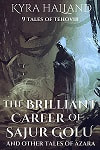|
I mentioned before (on my blog, and in comments on a couple of other blogs) that I have Chronic Fatigue Syndrome. I've had it for nearly six years now, and finally, after years of doctors dancing around the subject and not knowing what was wrong with me (I knew; it was obvious; you look up Chronic Fatigue Syndrome on any website dedicated to the subject and I'm a textbook case) I got a diagnosis a year ago. As much as you can get a definitive diagnosis for this: they take a complete history, take down all of your symptoms, do all the tests to rule out anything else that could be causing the fatigue and other symptoms, then if your history and symptoms are consistent with Chronic Fatigue Syndrome and they can't find anything else going on, then you most likely have CFS. It's a frustrating condition; there's no definitive medical test, no effective medical treatment, no cure. And a lot of doctors don't really even believe it exists. I've dealt with that way more than I should have to, and before I start ranting, I'll just move on with this post.
The only thing you can really do about CFS is to manage it with lifestyle management techniques. I was going to call this post "Living and Writing with CFS," but I still haven't got the "living" part down yet. I do have a program I'm supposed to be following - Mediterranean diet for its anti-inflammatory properties (I hate fish :( ), carefully managed exercise (with CFS, more exercise does not give you more energy; more exercise leaves you unable to get out of bed for a week), plenty of bed rest, supplements recommended by my doctor, and some other things I want to try. But it's hard to follow a program when you're stumbling around in a fog of exhaustion all the time, so I've got a lot of work to do on that. I'm not the person to be giving other people advice on living with and managing CFS. What this post IS about is writing with CFS. Someone who saw my comment on CFS and productivity on another blog (Dean Wesley Smith's, I think) wrote to me and asked if I'd written about my difficulties with being productive while having CFS. I hadn't, but I am now. The thing is, I've been pleasantly surprised by how productive I'm able to be considering my condition. The thing about CFS is it doesn't just cause physical fatigue. It also causes, among myriad other symptoms, mental fatigue, known as "brain fog." Memory problems, confusion, and difficulty concentrating are all part of this. Which, as you can imagine, makes any sort of sustained mental/intellectual work kind of difficult. But for a long time now, I've been able to maintain a writing schedule of about two hours a day nearly every day, which, considering the levels of exhaustion I have, is pretty good. And in recent months, I've seen that time creeping up to three hours a day. Not that I've been feeling better overall - I haven't - but I seem to have fallen into some habits that have helped increase my productivity. When I got that question last week, I started thinking about how I've managed to become more productive in spite of CFS, and came up with some ideas. 1. It really helps to break my writing hours up into smaller chunks of time, maybe 30-45 minutes or so, instead of working for two hours straight. As with physical activity, I've found that working in shorter periods of time and then taking a break actually allows me to be active a greater total number of hours. Also, find the times of day that work best for you, and protect these times as much as possible. 2. Find the writing process that works easiest and most naturally for you. Planner? Not a planner? Some of each? Write straight through or edit as you go? Writing software (another post for another time), Word, pen and paper? Concentrate on one project at a time or have a couple of different things you're working on? Whatever comes most easily to you, whatever makes you not have to burn energy fighting to follow the process, is the way you should write, no matter what way anyone else says is best. And be willing to change your process as you feel you need to, and as your current project demands. 3. Find ways to streamline the writing/editing process. Again, this is personal, but if you're going to produce books on any kind of schedule, you don't want to be taking a year or two to write a novel and another year or two to revise and edit it. Figure out the writing process that will help you get words written on a regular basis, and then if you revise and edit (some people don't; some people do their editing the first time around), find ways to cut down on the number of editing passes you need, which will cut revising/editing time from many months to a lot fewer months. I've recommended this before, and I will again: Holly Lisle's How To Revise Your Novel course is a great approach to adressing the major issues in your manuscript in one go and and getting that book out the door a lot faster. Don't "polish till it gleams" as the saying goes; this takes forever and has the tendency to strip away everything that's interesting and unique and YOU about the book. And don't go twenty rounds with your critique group on it, because then you end up with THEIR book written by committee (bleh) instead of YOUR book. My general philosophy on making shorter work of revising and editing is don't revise the story to death, and don't waste time revising to other people's rules or ideas of what your story should be. Get it good and get it out the door, and get to work on the next one. 4. Know when to call it quits for the day. There comes a time when the brain fog is thickening and most of what's coming out on the page (or the screen) is blathering. You're not doing any good, so even if you still have words or pages or time left to go on your daily quota, pack it in and get some rest. (This is also a REALLY GOOD TIME to get off the Internet, before you embarrass yourself. Which I sometimes have trouble remembering :-P) 5. Take care of yourself in general. Do what you can to follow your management program, if you have one. Get that few minutes of exercise. Get enough bed rest. Sleep is a big problem with CFS. A lot of time you don't sleep well, and even if you do, you wake up feeling like you didn't sleep at all. But being in bed resting is still better than being up, even if you can't sleep. I do best with ten hours a night of bed rest, whether I'm asleep or lying in bed reading. To figure out how much bed rest you need, go to bed at night then don't get up in the morning until you can do so without feeling like you're dragging a mountain out of bed with you. See how many hours that was; if you can do that every night, it does help. I also feel better if I'm eating a high fiber, fresh, fairly light diet and am careful not to overeat. (Another big IF; with so little energy, it's hard to cook like that on a daily basis.) 6. Stress burns a lot of energy, so find ways to manage stress. Meditation, or just letting your mind go blank while you listen to relaxing music; I've heard the yoga and tai chi are good but haven't tried them (mean to, just haven't gotten the spark of energy to try something new and different), eliminate unnecessary stress. Especially, don't spend energy comparing yourself and your productivity levels to other writers, and don't spend energy trying to do things that don't work for you. Find what works best for you, and be grateful you can do anything at all, because there's always someone even worse off. So, how productive am I, doing (or trying to do) these things? Well, since last November I've written one full-length novel draft, two novellas, two longer short stories, and three short-shorts. I finished editing and released one novel and one short story collection for sale, have another novel coming up for release in June, am working on edits on a novel that will hopefully be ready for release in October or thereabouts, and have also been getting the short stories edited and ready to post and release for sale. So, basically, I've increased my writing inventory by somewhere upwards of 140,000 words in the last six months and will have released 5 works for sale this year (3 novels and 2 short story collections.) So, not bad, not on the level of some really prolific authors, but enough to be able to start making a career of this. If you can do more than this, awesome. If you can't do this much, that's fine too. Do the best you can, and take satisfaction in knowing that you're doing the best you can, which is all any of us can do and a lot more than a lot of people ever do.
0 Comments
Your comment will be posted after it is approved.
Leave a Reply. |
AuthorI am Kyra Halland, author of tales of fantasy, heroism, and romance. Sign up for my email list
My Books
More Books
Click on the covers for more information
Categories
All
Archives
April 2024
Kyra Halland: Welcome to My Worlds is a participant in the Amazon Services LLC Associates Program, an affiliate advertising program designed to provide a means for sites to earn advertising fees by advertising and linking to amazon.com.
Other links on this site may also lead to products for which the owner may receive compensation. This website uses marketing and tracking technologies. Opting out of this will opt you out of all cookies, except for those needed to run the website. Note that some products may not work as well without tracking cookies. Opt Out of Cookies |
 RSS Feed
RSS Feed




























